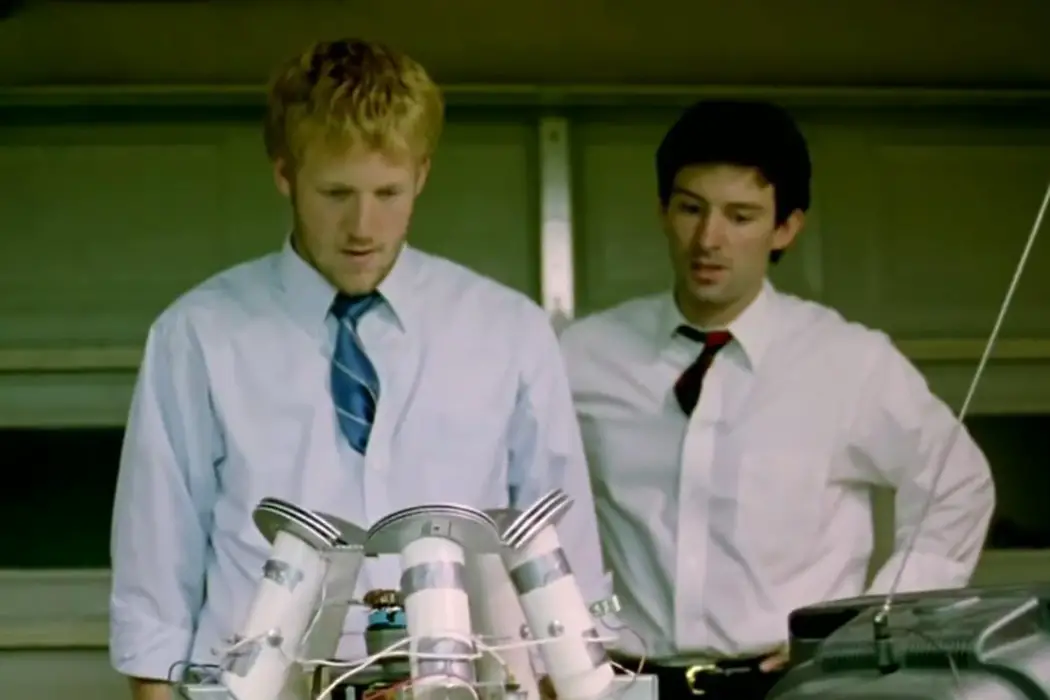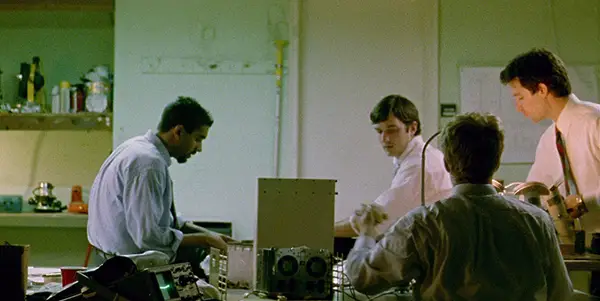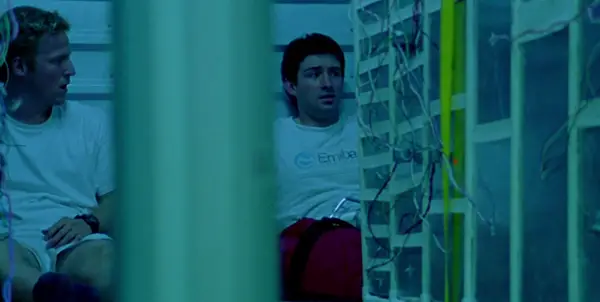Time Crisis: PRIMER

Christine is a software engineer currently working in the animation…
In our introduction to Time Crisis, we explored the definitive film adaptation of the most influential time travel story – George Pal’s 1960 version of The Time Machine. This time, we’re jumping to 2004 to talk about a film that redefined the time travel genre for the twenty-first century: indie director Shane Carruth’s Primer.
On a very high level, Primer tells the story of two white-collar engineers, Abe and Aaron, who inadvertently discover time travel while conducting garage experiments with electromagnetic weight reduction. The men begin to use their machine to their financial and personal advantages, but are soon forced to deal with an increasingly confusing and dangerous set of consequences.

I wanted to discuss Primer early on in this series because in addition to taking a rigorous approach to time travel logic, it gets to the core of one of time travel fiction’s key themes: identity and the self. We have a belief in the continuity of our own beings – we assume that we’re essentially the same person from day to day and throughout our lives. Time travel deconstructs this belief by allowing characters to literally face up to different versions of themselves. What would we do if we met ourselves? Would we like that person? Would “their” actions be consistent with “our” actions? Primer delves into these questions.
A Tech-Heavy Narrative Puzzle
We’re diving right into the deep end here – Primer is the most complex time travel film ever made. Its intricate narrative doesn’t just invite multiple viewings, it demands them. Multiple timelines create different versions of the story’s events which for a first-time viewer are impossible to track completely. Many scenes are not actually depicting what they initially appear to be, which further rewards repeated viewings.

On top of the narrative complexity, Shane Carruth’s esoteric dialogue can serve to intimidate many viewers. It’s at times so impenetrably technical that the characters may as well be speaking a foreign language. It’s not just made-up jargon, either: a former software engineer, Carruth integrated real physics and engineering principles into the characters’ project. He makes things even harder by dropping us into the middle of these technical conversations without much prior context, making Primer a practically exposition-free movie. Don’t panic if you feel like it’s all going over your head, especially in the first ten minutes: the point of this dialogue is to establish the characters and their relationships to each other, not to convey plot information.
Primer seems to require a lot from its viewers, but unlike many “challenging” films, it’s an unassuming piece of work, as hacked together as the time machine the protagonists accidentally create in their garage. First time writer-director Carruth filmed Primer in his parent’s house and locations in his hometown of Dallas on a sixteen millimeter camera with a cast of amateur actors. With a budget of only seven thousand dollars, he took the ultimate DIY approach, starring as Aaron himself and even composing his own music for the score.
The Mechanics of Time Travel in Primer
Before we dig further into Primer’s thematic content, let’s take a look at how time travel works in the film. Although the plot itself becomes almost intractably complicated, the basic time travel paradigm is simple.
The time machine, a box constructed with PVC pipe and duct tape and housed in a storage locker, only supports time travel to the past. Theoretically, there’s no limit to how far you can go back, but you have to turn the time machine on at the time you want to travel back to. Therefore, you need to plan ahead and switch it on some time before you actually go into it. This limits the scope of the film – we’re not dealing with the far past or far future.
The key to Primer’s drama is the fact that when a person travels back in time, they exist simultaneously with the past version of themselves. Nothing prevents the time traveler from interacting with the other version, their “double”, but the consequences of doing so are not initially known. Abe and Aaron take precautions to avoid this, hiding out in a hotel room for the span of time that they and their double both exist.

The basic sequence of events comprising one time travel “loop” is repeated throughout the film, so it’s important to understand. Let’s break it down step by step:
Step One: At time A, the starting point, the time traveler turns on the machine. They use a timer to start it, so that they are able to leave before the machine actually kicks on.
Step Two: The time traveler isolates themselves so that they don’t have any influence over their double, who will be exiting the time machine as soon as it starts up. The double’s appearance is contingent on the time traveler’s intent to get into the box in the future.
Step Three: Later in the day, let’s call it time B, the time traveler enters the machine. Once inside, they travel backwards in time at the same rate that they would normally travel forward, eventually exiting at time A.
Step Four: Now the time traveler has the time between A and B to influence the world with prior knowledge of what is going to happen. Meanwhile, the original version of the time traveler is in hiding, avoiding contact with their double. This version’s only future is to enter the machine, essentially disappearing into the past while their double continues on.
Which You are You?
The upshot is that when Abe and Aaron go through one of these time loops, they are not technically the same Abe and Aaron that they were before. This doesn’t have any obvious repercussions at first, but as they make mistakes and ultimately have run-ins with their doubles, they come to understand that their selves are not as consistent as they would imagine.
Aaron uses the machine to relive one day over and over again in order to make himself seem like a hero for dispatching a friend’s aggressive ex-boyfriend at a party. He’s trying to construct a new version of himself that he feels his unfulfilling job and family responsibilities have prevented him from becoming, but doing so literally fractures his identity in ways he never would have intended just days before. His friendship with Abe deteriorates entirely – they can no longer tell which version of each other they’re talking to, let alone trust each other as they did when they embarked on their venture. “Sometimes we do things, and we don’t know how we got to that point”, Aaron explains.
When two of the many versions of Aaron finally confront each other, they find that they have different ideas about how the rest of their lives should play out.
We don’t need a time machine to experience what Abe and Aaron go through in Primer. We do things every day that our past or future selves wouldn’t dream of doing. How do we get to the point where our values, the things we’re willing to do, are completely different? Like Aaron, we have our reasons, but these reasons might be incomprehensible to the other versions of ourselves that exist in other times, our “doubles”.
While most time travel films use the latitude afforded by the genre to tell stories that span decades, Primer narrows the focus to a very short span of time, mostly taking place in the same twelve-hour period. This serves to demonstrate that it doesn’t take years to become a different person – one bad day could send a person’s identity on a totally different trajectory. On some level, we’re as unable to predict our own behavior as we are anyone else’s, and that’s frightening. Time changes us, whether we want it to or not.
If you’ve seen it, what’s your take on Primer and its engagement with the theme of identity?
Does content like this matter to you?
Become a Member and support film journalism. Unlock access to all of Film Inquiry`s great articles. Join a community of like-minded readers who are passionate about cinema - get access to our private members Network, give back to independent filmmakers, and more.
Christine is a software engineer currently working in the animation industry. Hates Ferris Bueller's Day Off, Loves Star Wars. Writes at hackingcinema.com













